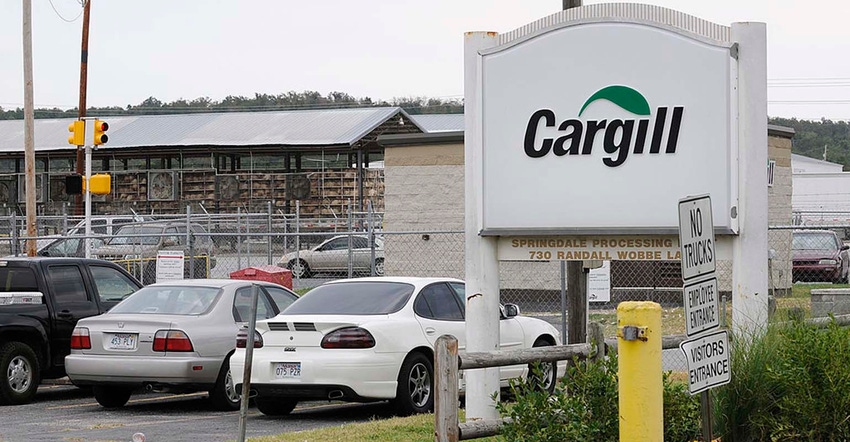
by Jen Skerritt, Shruti Date Singh and Megan Durisin
Cargill Inc.’s efforts to supply food companies with non-genetically modified ingredients have come under attack from the other side of its business: farmers.
In common with several other large agribusinesses, Cargill is adapting to a shift in consumer taste toward more products labeled non-GMO. And just like those companies, it too has agreed to allow the Non-GMO Project, a U.S. non-profit group, to verify some of its supplies to ensure they’re free of ingredients such as modified soy and corn.
But in recent days, Cargill, the country’s largest private company, has found itself on the defensive against criticism on social media over the relationship. The source of the controversy is the Non-GMO Project’s position that there’s no scientific consensus on the safety of GMOs. That’s contradicted by reports from National Academies of Sciences, Engineering and Medicine and the American Medical Association, who say GMO crops pose no more risk to human health than any other crops. Some farmers are unhappy that Cargill is endorsing a group so clearly opposed to GMO crops, which account for the vast majority of soybeans, corn and canola grown in North America.
“It’s a slap in the face,” said Chris Allam, a farmer who grows 6,000 acres (2,428 hectares) of canola near Fort Saskatchewan, Alberta. “I have a problem with Cargill dealing with someone who is staunchly against it.”
Monsanto Comment
Cargill announced its partnership with the Non-GMO Project in October, and said earlier this month it got verification for several additional ingredients, including Stevia sweeteners and soybean oil. The company is far from alone in working with the Bellingham, Washington-based group. Bunge Ltd., another large U.S. agricultural trader and processor, has had the group verify some milled corn ingredients and oils. In Canada, the group verifies canola oils produced by Viterra Inc., Glencore Plc’s agricultural unit.
Still, it’s Cargill’s arrangement that has stirred up a lively debate. Robb Fraley, chief technology officer at Monsanto Co., the world’s largest supplier of GMO seeds, weighed in last week on Twitter, saying he understands Cargill’s intent to support farmers and consumer choice, but also asking why the company is working with an "anti-science” group.
"I can understand why this feels threatening," Megan Westgate, executive director of the Non-GMO Project, said in an interview. “There’s a big paradigm shift happening. The largest food companies in the world are looking for non-GMO ingredients and that’s really changing the supply chain.”
Consumer demand for non-GMO food has risen exponentially and the Non-GMO Project’s mission is to make sure people have choices and options, she said. The group offers the only established, third-party non-GMO certification in North America and currently has 43,623 products verified to its standards.
Growing Population
“Some of the farmers’ concerns are well-founded, in that the Non-GMO Project is not an unbiased, non-aligned, independent lab,” said Peter Golbitz, founder of Estero, Florida-based Agromeris, a consulting firm for specialty agriculture products and ingredients. “Their true intent is to discredit GMO technology and to drive fear into consumers and the supply chain.”
Cargill says modified crops and non-GMO ingredients can co-exist, and that GMO technology is safe and plays a critical role in feeding a growing population. The company doesn’t share the non-GMO project’s position on GMOs, said Randy Giroux, vice president of food safety, quality and regulatory.
"There’s no bigger supporter of farmers and GMO technology than Cargill," Giroux said in a statement. "Like many other companies, Cargill’s affiliation with the Non-GMO Project is strictly limited to its rigorous verification process. Since there is no federal standard for non-GMO products in the U.S., companies like ours use private standards that the market recognizes."
Ingredion Inc., a U.S. producer of ingredients such as starches and sweeteners, says it had few alternatives to working with the Non-GMO Project. The group has verified 57 ingredients for the company, according to an Ingredion statement.
‘Politically Charged’
“We are not making a statement that one or the other is bad,” Igor Playner, the company’s vice president of innovation for North America, said in a telephone interview on Monday, referring to the debate over GMOs and non-GMOs. “There is demand for everything.”
Archer-Daniels-Midland Co., a U.S. agricultural trader and processor, handles both modified and unmodified crops, but hasn’t sought certification from the Non-GMO Project, company spokeswoman Jackie Anderson said in an email.
While there’s no issue with providing the consumer with more information from a third party, growers are upset Cargill is working with a “politically charged” activist group with an anti-GMO view that’s not based on logic or science, said Allam, the farmer in Alberta. GMO crops help boost yields and allow growers to better control grasses and other weeds with less chemicals and tillage, he said.
“I’m quite disappointed in Cargill’s position,” said D’Arcy Hilgartner, a farmer who grows canola on his family farm near Camrose, Alberta. “It’s like using Cargill money to fight against the good work growers are doing.”
--With assistance from Jack Kaskey.
To contact the reporters on this story: Jen Skerritt in Winnipeg at [email protected]; Shruti Date Singh in Chicago at [email protected]; Megan Durisin in Chicago at [email protected]
To contact the editors responsible for this story: Simon Casey at [email protected]
Robin Saponar
© 2017 Bloomberg L.P
About the Author(s)
You May Also Like




